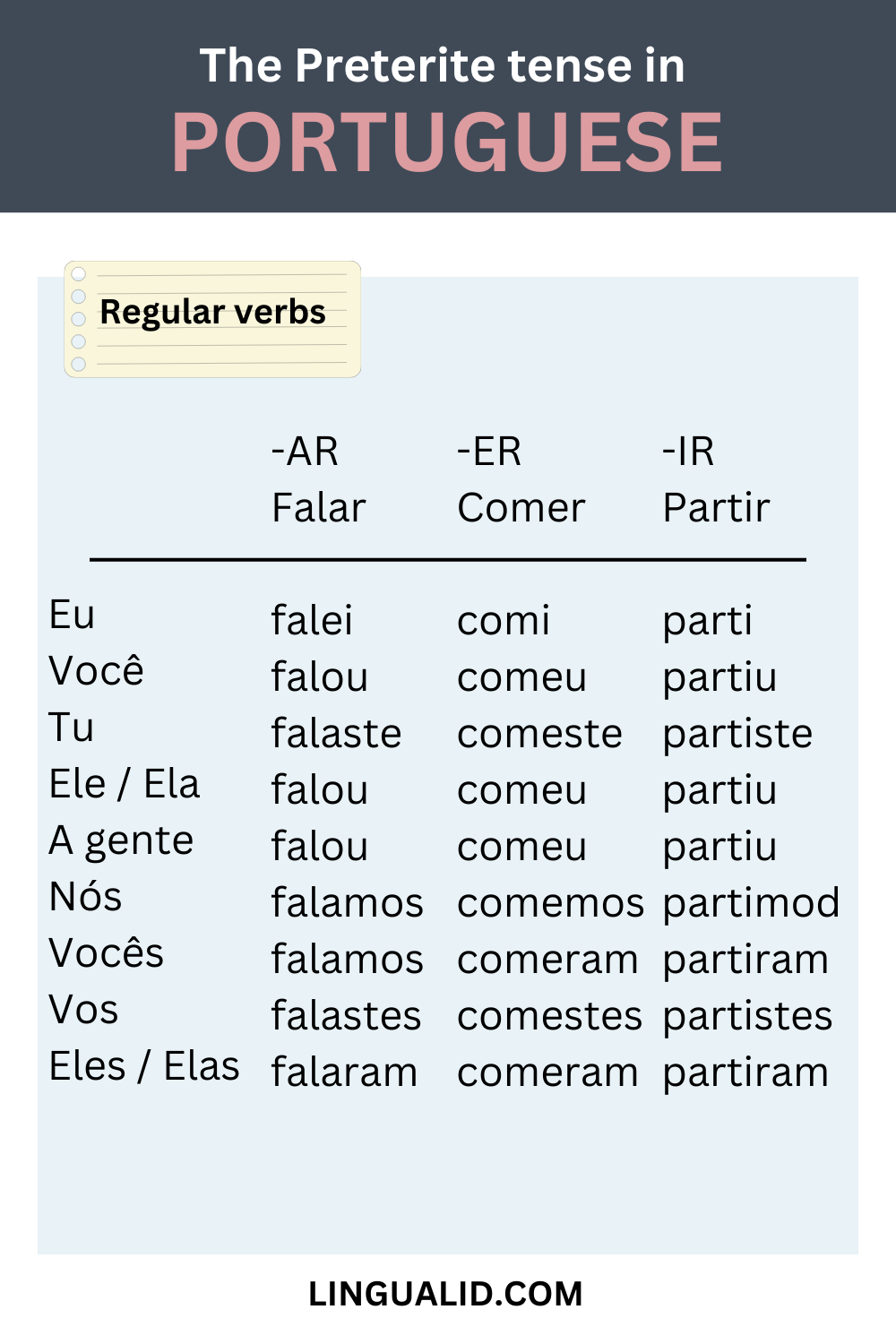The preterite tense in Portuguese (Pretérito Perfeito) is used to express an action in the past that is completed, in this lesson we will talk about the conjugation of each type (-ar, -er and -ir) and give some examples.

Preterite Tense In Portuguese
As we’ve seen in the present tense lesson, there are three types of endings, and for regular verbs, they follow the following patterns:
Verbs that end with -ar
| Eu | -ei |
| Você | -ou |
| Tu | -aste |
| Ele / Ela | -ou |
| A gente | -ou |
| Nós | -amos |
| Vocês | -amos |
| Vos | -astes |
| Eles / Elas | -aram |
Example: Estudar (to study):
| Eu | estudei |
| Você | estudou |
| Tu | estudaste |
| Ele / Ela | estudou |
| A gente | estudou |
| Nós | estudamos |
| Vocês | estudamos |
| Vos | estudastes |
| Eles / Elas | estudaram |
Example: Falar (to speak)
| Eu | falei |
| Você | falou |
| Tu | falaste |
| Ele / Ela | falou |
| A gente | falou |
| Nós | falamos |
| Vocês | falamos |
| Vos | falastes |
| Eles / Elas | falaram |
Verbs that end with -er
| Eu | -i |
| Você | -eu |
| Tu | -este |
| Ele / Ela | -eu |
| A gente | -eu |
| Nós | -emos |
| Vocês | -eram |
| Vos | -estes |
| Eles / Elas | -eram |
Example: aprender (to learn)
| Eu | aprendi |
| Você | aprendeu |
| Tu | aprendeste |
| Ele / Ela | aprendeu |
| A gente | aprendeu |
| Nós | aprendemos |
| Vocês | aprenderam |
| Vos | aprendestes |
| Eles / Elas | aprenderam |
Example: comer (to eat)
| Eu | comi |
| Você | comeu |
| Tu | comeste |
| Ele / Ela | comeu |
| A gente | comeu |
| Nós | comemos |
| Vocês | comeram |
| Vos | comestes |
| Eles / Elas | comeram |
Note: you can practice what you’ve learned here, and learn how to pronounce each of the words in our Memrise course here, don’t know how to use the platform or sign up? we’ve got you covered in this easy-to-follow tutorial here.
Verbs that end with -ir
| Eu | -i |
| Você | -iu |
| Tu | -iste |
| Ele / Ela | -iu |
| A gente | -iu |
| Nós | -imod |
| Vocês | -iram |
| Vos | -istes |
| Eles / Elas | -iram |
Example: decidir (to decide)
| Eu | decidi |
| Você | decidiu |
| Tu | decidiste |
| Ele / Ela | decidiu |
| A gente | decidiu |
| Nós | decidimod |
| Vocês | decidiram |
| Vos | decidistes |
| Eles / Elas | decidiram |
Example: partir (to leave)
| Eu | parti |
| Você | partiu |
| Tu | partiste |
| Ele / Ela | partiu |
| A gente | partiu |
| Nós | partimod |
| Vocês | partiram |
| Vos | partistes |
| Eles / Elas | partiram |
Some irregular verbs:
Ser and ir (to be and to go)
| Eu | fui |
| Você | foi |
| Tu | foste |
| Ele / Ela | foi |
| A gente | foi |
| Nós | fomos |
| Vos | fostes |
| Vocês | foram |
| Eles / Elas | foram |
Ter (to have)
| Eu | tive |
| Você | teve |
| Tu | tiveste |
| Ele / Ela | teve |
| A gente | teve |
| Nós | tivemos |
| Vos | tivestes |
| Vocês | tiveram |
| Eles / Elas | tiveram |
Vir (to come)
| Eu | vim |
| Você | veio |
| Tu | vieste |
| Ele / Ela | veio |
| A gente | veio |
| Nós | viemos |
| Vos | viestes |
| Vocês | vieram |
| Eles / Elas | vieram |
Fazer (to do)
| Eu | fiz |
| Você | fez |
| Tu | fizeste |
| Ele / Ela | fez |
| A gente | fez |
| Nós | fizemos |
| Vos | fizestes |
| Vocês | fizeram |
| Eles / Elas | fizeram |
Estar (to be)
| Eu | estive |
| Você | esteve |
| Tu | estiveste |
| Ele / Ela | esteve |
| A gente | esteve |
| Nós | estivemos |
| Vos | estivestes |
| Vocês | estiveram |
| Eles / Elas | estiveram |

Happy learning!
